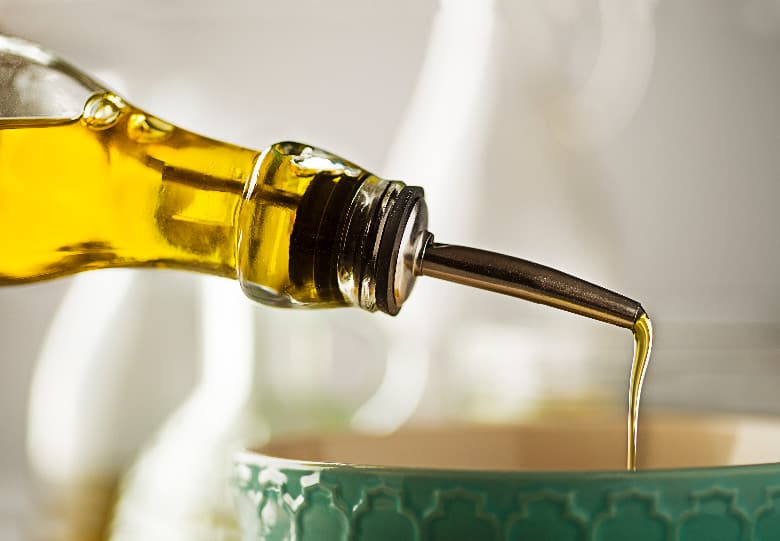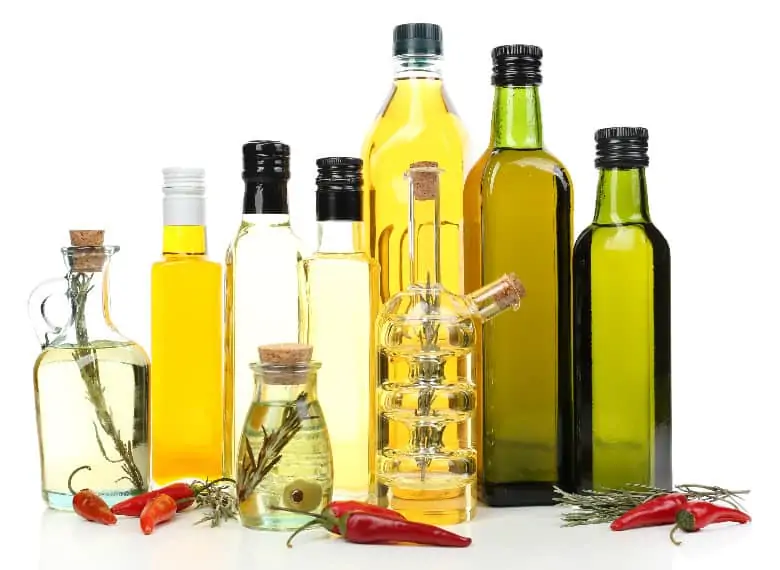Take a walk down the cooking oil aisle at the market and you’ll be bombarded with options. Should you go with a cheaper bottle of canola oil or stock up on a jug of olive oil? Oh, how I’ve been there.
Finding the best oil to cook with can be downright perplexing. Admittingly, I used to rely on extra virgin olive oil for everything. I’d drizzle it over sliced tomatoes, use it to sauté my veggies, and brush it on anything and everything that got tossed on the grill.
That is until one of my chef friends told me to pay better attention to the oil I use. Doing a deep dive into the world of food science, I realized he was right. Peer-reviewed articles and cooking experts all recommend various cooking oils for specific purposes.
Cooking oil smoke points, fats, and flavors all vary. Some are meant to be used when grilling. Others are better for sautéing.
If your mind is now racing with questions, I’m here to help. I’ll walk you through a list of the best cooking oils along with some tips on how to choose.
Related: Check out our other guides for more useful tips.
How To Choose the Right Oil
Here are the main factors to consider when deciding which oil to drizzle in the pan and which one is better left for another meal.
Smoke Point
When choosing the best oil to cook with, considering the smoke point is a must. As oil begins to smoke, it changes flavor and begins to oxidize. It also produces free radicals which are very bad for your health.
If you are going to fry, sear, grill, or cook anything over high heat, you’ll need a high smoke point to match. All cooking oil with a low smoke point should be used on low or no heat.
Flavor Profile
Different oils have different flavor profiles that can enhance or distract from the ingredients of your dish. For instance, the flavor profile of coconut oil does well to complement spicy curries.
However, it does have a distinctive tropical, fruity flavor that may not taste so good with something like fried pickles. Canola oil would be the better choice for this as it has a more neutral flavor profile.

All About the Fats
In a low fat, low-calorie world, many of us are automatically inclined to think that all fats are bad fats. The truth is, some are, and some aren’t.
Here’s the deal. Your body needs fat as part of a healthy diet.
Fats help your body absorb nutrients like fat-soluble vitamins. They also provide essential fatty acids that the body can’t produce on its own. Such as omega-3 and omega-6.
Some fats are even good for your heart. Monounsaturated and polyunsaturated fats fall under this category.
Saturated and trans fats fall under the bad fat category. These are the fats that can lead to an array of health problems such as high cholesterol and heart disease. That said, all cooking oils have both saturated and unsaturated fats.
Typically, the more solid the oil, the higher the saturated fat. And the higher the saturated fat, the higher the smoke point.
Refined, Bleached, Deodorized
Refined, bleached, and deodorized (RBD) refers to how the oil is processed.
According to the Harvard School of Public Health, RBDs are processed by crushing the selected ingredient, then extracting the rest of the oil with a low-boil solvent such as hexane. This helps increase stability. Bleaching and deodorizing are then used to reduce pigment and neutralize flavors.
An example of such an oil is canola oil. Unless otherwise stated, all canola oil you buy is refined.
Best Cooking Oils
Here’s a look at 10 of the most commonly used healthy cooking oils, as well as some tips for making the most of their distinct properties.

Avocado Oil
Refined avocado oil has an exceptionally high smoke point at 520°F. You can use it to roast, grill, stir-fry, and sear. Slather it on some kabobs or rub it on your burger and toss it on the barbeque.
Unrefined avocado oil has a lower smoke point so it’s best reserved for low heat cooking. The slightly creamy flavor complements vinaigrettes well. If you want to go full millennial, drizzle some on your avocado toast.
Avocado oil is packed with heart-healthy oleic acid (a fatty acid) and monounsaturated fats. No matter how you eat it, you’ll be getting some great nutritional benefits.
Smoke Point: 520°F (refined), 375°F (unrefined)
Pantry Shelf Life (unopened/opened): 1 year/6 months
Recommended Storage: Cool, dark dry place
Uses: Grilling, searing, stir-frying, roasting, dressing, finishing oil
Extra Virgin Olive Oil
Extra Virgin Olive Oil, or EVOO, is a must for every kitchen. This oil tastes good on pretty much anything which is why it’s so highly loved.
Try a dash and you’ll pick up on a range of flavor nuances that varies by place of origin. Buttery, bitter, and grassy are a few to note.
Although it’s a versatile accompaniment, that stops once you introduce heat into the equation. EVOO has a low smoke point. This means it’s best used with foods that require low to no heat.
Think finishing oil or vinaigrettes. You could also use it with meals that require very low heat like scrambled eggs.
A staple of the Mediterranean diet, EVOO has been highly denoted as one of the healthiest cooking oils on the shelf. This is because it’s high in good fats, and is not refined.
Smoke Point: 375°F
Pantry Shelf Life (unopened/opened): 2 years/1 year
Recommended Storage: Cool, dark dry place
Uses: Low heat sautéing, baking, finishing oil, dressings
Canola Oil
You’ve undoubtedly bought canola oil at some point, but do you know what it is? Canola is a plant in the Brassica family, think broccoli and mustard. The seeds are crushed to extract the oil.
Canola oil is loved for its very mild flavor and high smoke point. It’s an excellent choice for frying and ideal when you desire a neutral flavor.
While you may not realize it from the cheap packaging, canola oil is not as bad for you as it may appear. It’s higher in monounsaturated fats than saturated fats.
Aside from all that, one of the great things about canola oil is the long shelf life. An opened bottle can last you about a year when stored right.
Smoke Point: 400°F
Pantry Shelf Life (unopened/opened): 2 years/1 year
Recommended Storage: Cool, dark dry place
Uses: Frying, sautéing, baking, marinades, grilling
Coconut Oil
Coconut oil is one of those common foods that always seems to be a target of the good for you, bad for you debate. Some of this has to do with the saturated fat content. On the plus side, coconut oil has been shown to raise the HDL levels in your blood, which is a good thing.
Coconut oil is higher in saturated fats than other oils. This is great news for foods that require high heat cooking because the fats remain more stable.
It’s solid at room temperature so I wouldn’t recommend using it as a dressing. However, the high cooking point of refined coconut oil is ideal for all your searing and stir-frying. Unrefined coconut oil has a lower smoke point so save that for your baking.
Smoke Point: 450°F (refined), 350°F (unrefined)
Pantry Shelf Life (unopened/opened): 1 year/1 year
Recommended Storage: Cool, dark dry place
Uses: Searing, stir-frying, sautéing, baking
Grapeseed Oil
Looking to reduce your saturated fats? Try switching to grapeseed oil. Grapeseed oil is high in polyunsaturated fats and omega-6.
It’s mild in flavor and can be used as an alternative to canola oil for frying. Double up on your omegas and use it to fry up an omega-3 rich fish filet.
The flavors are clean on the palate and won’t distract from your shining ingredients. This is why many in the food industry refer to it as an “all-purpose oil”. Just be sure to use it up by the expiration date before it goes rancid.
Smoke Point: 420°F
Pantry Shelf Life (unopened/opened): 1 year/6 months
Recommended Storage: Cool, dark dry place
Uses: Sautéing, frying, stir-frying, grilling
Peanut Oil
Most of the peanut oil you’ll find is refined. This is done to reduce allergic reactions. This also helps achieve a high smoke point.
Depending upon the brand, peanut oil can have a strong nutty flavor. Try using it to fry some chicken or sauté some tofu. The nutty flavors go particularly well with Asian cuisines.
Like avocado oil, it’s high in monounsaturated fats. It’s also high in vitamin E.
If you’re worried about it going bad before you can use it all up, store it in the refrigerator. This could enhance the shelf life by up to a year.
Smoke Point: 450°F
Pantry Shelf Life (unopened/opened): 1 year/6 months
Recommended Storage: Refrigerator
Uses: Frying, stir-frying, sautéing, grilling
Safflower Oil
Roasting, sautéing, drizzling, or frying, safflower oil is an excellent choice. It has a very mild flavor and is great for high heat cooking.
In fact, safflower oil has one of the highest smoke points around. Give it a try next time you go on a deep-frying kick.
While fried food may not be the healthiest option, at least safflower oil is. It’s high in good fats and low in bad fats. It also is slightly lower in calories than other oils. When stored right, it has an excellent shelf life.
Smoke Point: 520°F
Pantry Shelf Life (unopened/opened): 2 years/1 year
Recommended Storage: Cool, dark dry place
Uses: Frying, deep-frying, roasting, sautéing, grilling, dressing, marinades
Sesame Oil
Sesame oil has a nutty flavor that tastes amazing in Asian marinades. You can even try it in your hummus if you don’t have any tahini laying around.
The smoke point is relatively high at about 410°F. Use it to roast some garlicky broccoli or try it in a beef bok choy stir-fry.
To preserve the quality and nutrients, store sesame oil in the refrigerator. It’s rich in both monounsaturated and polyunsaturated fats.
Smoke Point: 410°F
Pantry Shelf Life (unopened/opened): 1 year/6 months
Recommended Storage: Refrigerator
Uses: Roasting, stir-frying, marinades
Sunflower Oil
The slightly nutty flavor and high smoke point of sunflower oil make it an excellent choice for your pantry. Sautéing, searing, and frying are some recommended uses.
Use it on the griddle when cooking pancakes. The flavor tastes great whether you choose sweet or savory toppings.
One study showed that sunflower oil had a greater reduction rate in LDL cholesterol than olive oil. It’s also high in vitamin E.
Smoke Point: 450°F
Pantry Shelf Life (unopened/opened): 1 year
Recommended Storage: Cool, dark dry place
Uses: Frying, sautéing, stir-frying, grilling, baking
Walnut
Looking to get more omega-3 fatty acids in your diet? Drizzle it on a refreshing Caprese salad to add a nutty kick. Or use it in your bulletproof coffee instead of coconut oil to reduce saturated fat.
What you don’t want to do is cook with it. Walnut oil offers great health benefits and a unique flavor, but it’s not so good for cooking. It can also turn rancid faster than other oils so by all means keep it in the fridge.
Smoke Point: 320°F
Pantry Shelf Life (unopened/opened): 1 year/3 months
Recommended Storage: Refrigerator
Uses: Finishing oil, dressing
List of Common Cooking Oils
| Type | Smoke Point | Shelf Life (sealed/opened) | Storage | Uses |
|---|---|---|---|---|
| Avocado | 520°F (refined) 375°F (unrefined) | 1 yr/6 mo | Cool, dark, dry | Everything |
| Extra Virgin Olive | 375°F | 2 yr/1 yr | Cool, dark, dry | Low heat sautéing Baking Finishing Dressings |
| Canola | 400°F (refined) | 2 yr/1 yr | Cool, dark, dry | Frying Sautéing Baking Marinades Grilling |
| Coconut | 400°F (refined) 350°F (unrefined) | 1 yr/1 yr | Cool, dark, dry | Searing Sautéing Stir-frying Baking |
| Grapeseed | 420°F | 1 yr/6 mo | Cool, dark, dry | Frying Sautéing Stir-frying Grilling |
| Peanut | 450°F (refined) | 1 yr/6 mo | Refrigerator | Frying Sautéing Stir-frying Grilling |
| Safflower | 510°F (refined) 225°F (unrefined) | 2 yr/1 yr | Cool, dark, dry | Frying Deep-frying Roasting Sautéing Grilling Dressings Marinades |
| Sesame | 410°F | 1 yr/6 mo | Refrigerator | Roasting Stir-frying Marinades |
| Sunflower | 440°F (refined) 225°F (unrefined) | 1 yr/1 yr | Cool, dark, dry | Frying Sautéing Stir-frying Grilling Baking |
| Walnut | 320°F (unrefined) | 1 yr/3 mo | Refrigerator | Finishing Dressing |
| Corn | 350°F (unrefined) | 6 mo/6 mo | Refrigerator | Deep frying Grilling Sir-frying Baking |
| Palm | 450°F | 1 yr/1 yr | Cool, dark, dry | Frying Sautéing Baking |
| Butter | 300°F | 3 mo/3 mo | Refrigerator | Sautéing Baking |
| Ghee (clarified butter) | 480°F | 1 yr/1 yr | Refrigerator | Searing Roasting Finishing Sautéing Baking |
| Lard | 375°F | 1 yr/1 yr | Refrigerator | Roasting Sautéing Baking Grilling Frying |
Cooking Oils You Should Avoid
Palm Oil
From manufacturing to consumption, palm oil has raised some controversy. And for good reason.
Palm oil crops grow in tropical climates. These climates have been subjected to loss of biodiversity from agricultural practices associated with the high demand for palm oil. Additionally, palm oil has been associated with cardiovascular health problems.
Coconut oil is a better substitute. It’s also solid at room temperature and is good for high heat cooking.
Trans Fat (Partially Hydrogenated Oil)
Some vegetable oils are used to produce partially hydrogenated oils. This is where most of the trans fats come from that we consume.
Partially hydrogenated oils are the exact opposite of healthy. They’ve been linked to cardiovascular disease and high cholesterol.
A better option would be canola oil. It has a good shelf life, neutral flavor, and decent smoke point without all the health risks.
Questions I Get All The Time
Although some of these questions have been partially answered earlier in the article, I have answered them so many times in the past I thought it would be worth giving them their own section.
What are the benefits of avocado oil?
Avocado oil is loaded with healthy monounsaturated fats (70%) It’s not just healthy but also has a higher smoke point than many other oils making it great for a wide variety of dishes. Its mild flavor won’t overpower the foods cooked with it. Avocado oil is high in vitamin E, a fat-soluble antioxidant that helps protect cells.
What is vegetable oil?
Vegetable oil refers to any oil derived from plants, and the benefits of a vegetable oil is determined by its source and specific use. They’re not necessarily bad for you, but healthier oils like olive or avocado oil bring more to the table (pun intended). Because vegetable oils are refined and processed, they are devoid of not only flavor but also nutrients.
What is Extra Virgin Olive Oil?
Olive oil is the result of pressing the olives and extracting the oil (duh!). The term “extra virgin” indicates that the olive oil has not been further processed and thus is of high quality.
What is the best oil for stir-frying?
Avocado oil is a fantastic option. It’s unrefined, like extra virgin olive oil, but it has a greater smoking point, allowing higher cooking temperatures, making it ideal for stir-fries.
What Happens When Oil Is Heated Beyond Its Smoke Point?
The oil oxidizes and releases free radicals as it degrades. These substances have the potential to be harmful to one’s health, causing cellular damage that can lead to disease. Furthermore, when oils reach their smoke point, a chemical known as acrolein is released, which has a nasty burnt flavor.
What are the benefits of cooking oil that has undergone minimal processing?
Highly refined oils have a consistent appearance and tend to be less costly, whereas oils that have undergone minimal processing may contain sediment particles, have a cloudier appearance, and retain more of their natural flavor and color.
What are Healthy Fats?
Unsaturated fats are considered healthy fats. There are 2 types, monounsaturated and polyunsaturated fat. Monounsaturated fat is found in avocado oil, various nut oils, and vegetable oils, such as canola, olive, and peanut oils. Polyunsaturated fat is found in flaxseed, sunflower, and sesame oil. Also, fish, walnut, and safflower oils. Eating foods that are high in unsaturated fats can help lower your LDL cholesterol, and is good for your heart and overall health.
What are Trans Fats?
There are two types of trans fats; natural and artificial. It’s the artificial type, also known as hydrogenated vegetable oil, that has health experts concerned. They are suspected of causing all kinds of health problems from heart disease, diabetes, inflammation, cancer, and others. They are generally found in a variety of processed foods. The FDA (Food and Drug Administration) has banned the use of hydrogenated vegetable oil in most foods but it can still be found in the marketplace, so please read those labels.

Related: Is All Purpose Flour The Best Solution For Every Recipe?
Conclusion
When choosing a cooking oil, you should really consider the smoke point and flavor. Some oils have more prominent flavors like peanut oil. Others like walnut oil should never be used at high heat.
You should also pay attention to the fat content and process. Refined oils are more processed. Whereas others like extra virgin olive use the least processing production methods. It’s also high in healthy fats.
Try mixing it up and using different oils for different dishes. You may just find yourself a new perfect match.
